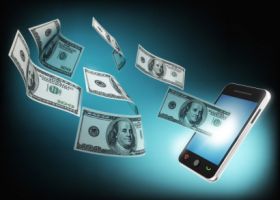Will your smartphone make your credit card obsolete?
By Justin Boyle

I remember 2004. Smartphones were barely recognizable by today's standards. They had physical keyboards, tiny, non-touch screens and the newfound capability to send and receive email. Things have changed a lot in eight years.
Looking back on those days, it's easy to notice how many parts of formerly everyday life have vanished thanks to leaps and bounds of advancement in smartphone technology. As recently as eight years ago, when cellphones were already ubiquitous, many professionals still carried a Pocket PC or digital organizer (some also carried a little chirping brick called a "pager," a primitive text-messaging device that could only display numerals).
According to some experts, in another eight years we'll look back on 2012 with the same sort of wonder, but it won't be day planners and calculators that get phased out. A recent study by the Pew Research Center suggests smartphones might make your credit cards obsolete.
Mobile payments on the rise
In the past few years, banks and credit companies have been exploring the ways in which smartphones can interact with the way we manage our personal finances. Chase, Summit Bank and multiple credit unions have implemented software applications that let you deposit paychecks with your phone's camera, and mobile control of your banked assets has been around for so long it's a wonder we ever did without it.
Visa has partnered with multiple banks to launch trials of its mobile payment program, and, last summer, Google rolled out a field-test program for Google Wallet, a smartphone credit card system that can hold data for several payment cards. Credit card terminal manufacturer VeriFone reported last year that they're making moves to outfit all new terminals with the capability to receive mobile payments by the end of 2012.
Some consumers have expressed concerns about the security of this type of funds transfer, which uses a wireless protocol known as near-field technology, but experts in the tech field suggest that these concerns are unwarranted. Gas cards with rewards have used near-field tech for years, in the form of ExxonMobil SpeedPass and other programs, and security measures have improved tremendously.
Smartphone credit cards around the world
In a 2011 study, Juniper Research predicted that the worldwide market for mobile payment transactions will balloon to $670 billion by 2015. If American cardholders are skeptical of the system, where is all that money coming from?
West Africa, for one. Mobile payments technology from a transactions company called Kopo Kopo allowed about 70 percent of Kenyan consumers to pay with their phones in 2011, according to a Wall Street Journal report. What's more, VeriSign India has been rolling out mobile payments in South Asian cities since 2007, with a potential reach of nearly one billion customers. Remember to find out if your no charge overseas cards can be attached to mobile payments software before you travel abroad.
Not everyone in North America is reluctant to adopt smartphones as credit cards. In perhaps the most prominent stateside example of mobile payments technology in practice, subway stations and taxis in New York City began accepting smartphone payments in 2010. In the years since, gas stations, pharmacies, convenience stores and high-end retail outlets across the country have begun to accept phone swipes.
With VeriSign and other terminal manufacturers already incorporating mobile swiping into their credit card readers, digital money might be moving away from the magnetic signatures of traditional credit cards before you know it. If your bank offers mobile payment services, it wouldn't be a bad idea to try it out early. (But first, be sure you understand what you need to do to keep your information secure.)
Finally, even though experts agree that it's safe to expect your phone to replace your wallet sooner than later, it might take a few more years before the soon-to-be old fashioned magnetic strip method of digital currency becomes truly obsolete. After all, even with hundreds of comparable apps in the iPhone store, college bookstores still carry pocket calculators.
Justin Boyle is a freelance writer living in Austin, Texas.